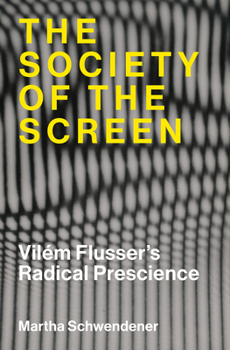The Society of the Screen: Vilém Flusser's Radical Prescience
How a lifelong engagement with experimental art informed the brilliant Czech-Brazilian philosopher Vil m Flusser's early vision of a world dominated by glowing screens. Predicting the importance of technology and images in the twenty-first century as early as the 1970s, Vil m Flusser warned, "the basic structure of our thinking is about to experience a mutation." The bewitching images and screens that surround us could lead toward a centrally programmed, totalitarian society--or another, better one characterized by dialogue and collaboration among humans and new forms of intelligence. In this book on the idiosyncratic and prescient Czech-Brazilian philosopher, art historian and critic Martha Schwendener explores the profound effect of art on Flusser's thought. The Society of the Screen reveals how Flusser's lifelong engagement with experimental practices--from abstract painting and concrete poetry in Brazil to video, cybernetics, and photography in Europe and the United States--as well as his extensive involvement with the S o Paulo Biennial informed his belief that we were moving from "history"--a civilization informed by linear writing--into "post-history," dominated by technical images. The book delves deeply into how Flusser's ideas evolved, particularly in correspondence and collaboration with artists like Mira Schendel, Fred Forest, Wen-Ying Tsai, Harun Farocki, Louis Bec, and Karl Gerstner.
Format:Paperback
Language:English
ISBN:0262051222
ISBN13:9780262051224
Release Date:March 2026
Publisher:MIT Press
Length:406 Pages
Customer Reviews
0 rating





